Using Peer Mentoring to Support Autism Skills
Empowering Autism Skills Through Peer Mentorship Programs

Introduction to Peer Mentoring in Autism Support
Peer mentoring has emerged as a powerful strategy to support autistic individuals across various settings including educational institutions, workplaces, and community groups. This approach enhances social engagement, academic success, and emotional well-being by fostering mutual understanding and tailored support among peers. The following narrative explores how peer mentoring complements traditional therapies, its applications, benefits, challenges, and future directions to optimize support for autistic individuals.
Understanding Applied Behavior Analysis (ABA) Therapy in Autism Support
What is Applied Behavior Analysis (ABA) therapy and how is it used to support individuals with autism?
Applied Behavior Analysis (ABA) therapy is an evidence-based intervention grounded in the scientific principles of learning and behavior. It is widely used to support individuals with autism by enhancing beneficial skills such as communication, social interaction, and daily living activities. ABA achieves this by carefully increasing positive behaviors and decreasing challenging or disruptive behaviors through techniques like positive reinforcement.
How ABA supports individuals with autism
ABA programs are tailored to each individual's unique needs following comprehensive assessments. Therapists identify specific goals and design interventions to promote skill development and independence. By consistently applying ABA methods, individuals can improve in various domains, including social skills, academic engagement, and adaptive functioning.
Settings where ABA is delivered
ABA therapy is versatile and delivered across multiple environments to ensure generalization of skills. Common settings include:
- Home: Personalized coaching and in naturalistic contexts
- School: Integration with educational goals and peer interactions
- Specialized clinics or centers: Focused therapeutic sessions with professional oversight
Role of ABA professionals
Qualified ABA professionals, such as Board Certified Behavior Analysts (BCBAs), oversee assessment, program design, staff training, and progress monitoring. They ensure interventions follow ethical guidelines and adapt strategies to suit evolving needs, thus optimizing therapy effectiveness and promoting lasting positive outcomes.
Main Goals and Techniques of Applied Behavior Analysis
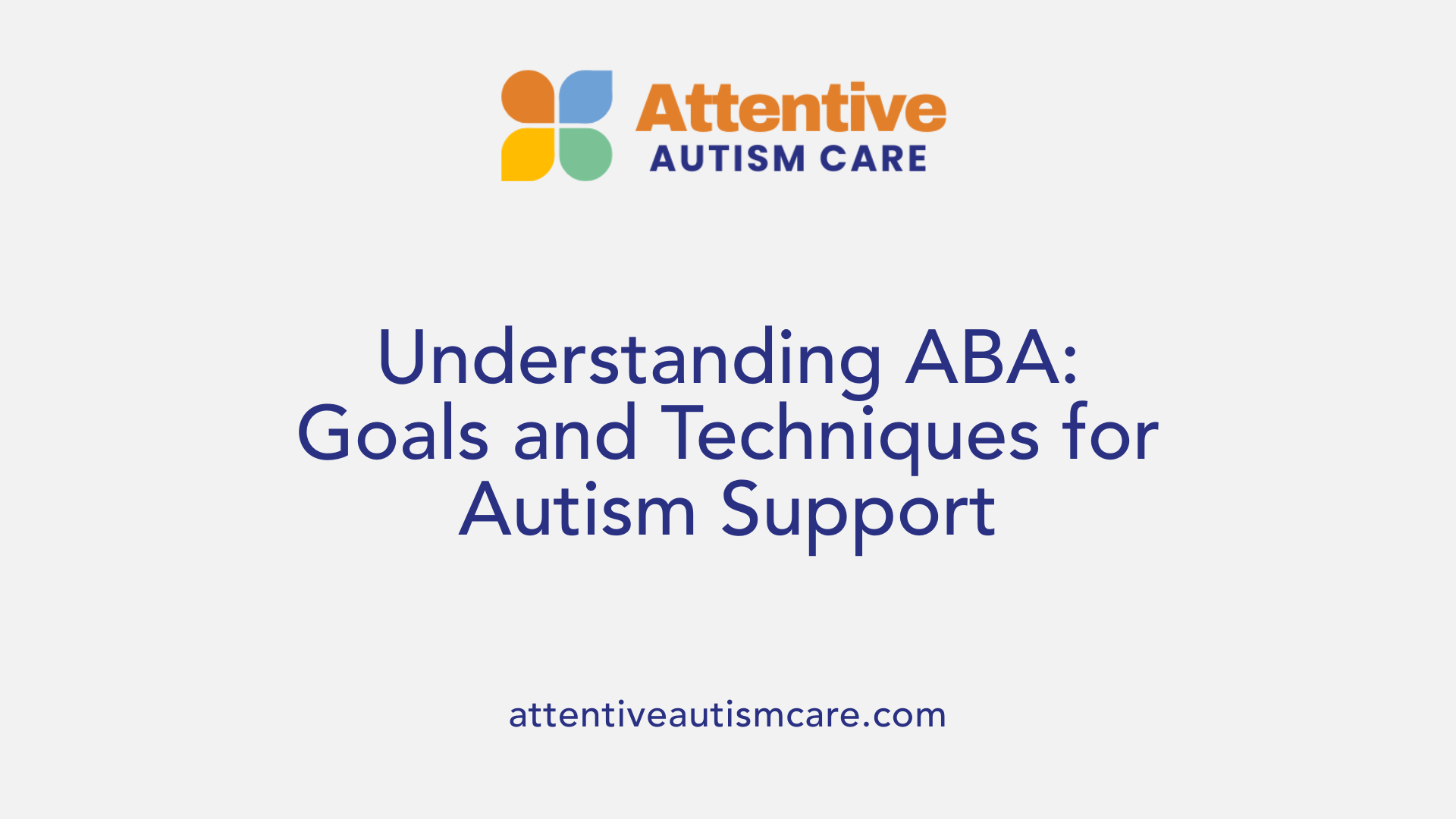
What are the main goals and techniques used in ABA therapy?
Applied Behavior Analysis (ABA) aims to promote meaningful behavioral changes in autistic individuals. The primary goals focus on increasing helpful behaviors such as communication, social skills, and independence, while reducing harmful or disruptive behaviors.
Key techniques used in ABA therapy
ABA employs several effective techniques, including:
- Reinforcement: Both positive and negative reinforcement strengthen desired behaviors by applying rewards or removing unpleasant stimuli.
- Prompting and Fading: Assistance is given to encourage a behavior, which is gradually reduced as independence improves.
- Discrete Trial Training (DTT): A structured method that breaks skills into small, teachable steps.
- Behavior Chaining: Linking sequences of behaviors to perform complex tasks.
- Modeling: Demonstrating desired behaviors for imitation.
- Behavior Contracts: Agreements outlining expectations and consequences to encourage responsibility.
Importance of data collection and progress tracking
Continuous assessment through systematic data collection is crucial in ABA. It ensures interventions are tailored to the individual's needs and allows practitioners to monitor progress and make necessary adjustments. This evidence-based approach maximizes the effectiveness of therapy and supports ongoing development.
Professionals Who Provide ABA Therapy and Their Qualifications
Roles of BCBAs, RBTs, and Behavior Therapists
Applied Behavior Analysis (ABA) therapy is delivered by a team of professionals with varying roles and qualifications. Board Certified Behavior Analysts (BCBAs) are masters or doctoral-level clinicians who design and oversee ABA programs tailored to the individual's needs. They are responsible for assessment, treatment planning, and evaluation of progress.
Registered Behavior Technicians (RBTs) work under the close supervision of BCBAs. They complete a 40-hour training program and pass a competency exam to gain certification. Their primary role is to implement therapy sessions following established plans.
Behavior Therapists often assist with direct intervention and may be trained on the job or through certificates. They support both BCBAs and RBTs in delivering consistent and effective therapy.
Certification and Training Requirements
BCBAs must earn a graduate degree in behavior analysis or related fields, complete specific supervised experience hours, and pass the Behavior Analyst Certification Board (BACB) examination. They also engage in ongoing continuing education to maintain their credential.
RBT certification requires completion of mandated training, demonstration of practical skills, and adherence to ethical standards, with supervision typically constituting 5% of their treatment hours.
Behavior Therapists' qualifications vary but generally include foundational training and workshops focusing on ABA principles, with some agencies providing in-house training programs.
Supervision and Ongoing Education
Effective ABA therapy depends heavily on consistent supervision. BCBAs provide ongoing oversight to ensure fidelity to treatment plans and adapt interventions as needed.
Both BCBAs and RBTs participate in continuous learning through workshops, seminars, and professional development courses to stay current with advances in ABA and autism support.
This structured team approach ensures that individuals receiving ABA benefit from specialized expertise and coordinated care, enhancing treatment quality and outcomes.
The Role of Peer Mentoring in Autism Support
What is Peer Mentoring and What Are Its Benefits?
Peer mentoring involves experienced peers offering guidance, support, and companionship to autistic individuals. It is commonly implemented through structured programs in schools, universities, workplaces, and community settings.
This approach helps foster social cohesion, mutual respect, and acceptance by incorporating universal design principles and participatory activities. For autistic individuals, peer mentoring offers tangible benefits such as increased confidence, reduced feelings of isolation, and improvements in overall well-being.
How Does Peer Mentoring Enhance Social Interaction and Academic Engagement?
School-based initiatives effectively improve social skills and academic involvement for autistic students. Programs like the Options Program at Bishop Hendricken High School emphasize mentorship that supports social integration and friendship development.
In higher education, customized programs such as Adelphi University's Bridges Program provide weekly one-on-one sessions targeting social skills, communication, and academic self-management. These efforts have led to positive outcomes including higher GPAs, better retention rates, and enhanced social support networks.
How Does Peer Mentoring Promote Independence and Self-Advocacy?
Peer mentoring encourages autistic individuals to articulate their needs, set personal goals, and practice leadership — fundamental skills for independence. Training mentors in neurodiversity awareness and offering flexible meeting options support individualized engagement.
Such programs empower autistic youth and adults alike to gain self-confidence and navigate academic, social, and employment challenges more effectively. Additionally, involvement in peer mentorship fosters lifelong connections and ongoing support.
In summary, peer mentoring serves as a multifaceted tool in autism support by nurturing social interaction, academic success, and personal autonomy through empathetic, individualized guidance.
School-Based Peer Mentoring Programs for Autistic Students
Improvements in Social Skills and Academic Outcomes
Peer mentoring programs within school settings have demonstrated significant benefits for autistic students. These programs notably enhance social interaction, academic engagement, and the quality of friendships. Evidence from studies (Carter et al., 2016; Asmus et al., 2016) highlights that participation in peer support initiatives can lead to better communication skills, increased attendance at social events, and improved academic self-efficacy. Some programs report measurable improvements such as higher GPAs and increased student retention, underscoring the positive academic impact alongside social gains.
Examples of Successful School Programs
A standout example is the Options Program at Bishop Hendricken High School in Rhode Island. This initiative utilizes peer mentorship to foster integration, independence, and social skills development among autistic youth. The structure involves trained peer mentors who support autistic students, helping them navigate both social settings and academic demands. The program's success is grounded in individualized support and inclusive practices that encourage self-advocacy and confidence-building.
Parent and Student Testimonials
Parents of students involved in the Options Program have observed marked increases in their children’s confidence and independence. Testimonials underscore the transformative effect that peer mentorship has on students’ willingness to engage socially and take initiative in their learning. Students themselves often report feeling more understood and included, which contributes to a more positive school experience and stronger peer relationships.
Together, these programs demonstrate how school-based peer mentoring can be a powerful tool in promoting both social and academic success for autistic students, enhancing their overall school experience and personal development.
University Peer Support: Bridging Social and Academic Challenges
How are college-based peer mentoring programs structured?
Peer mentoring programs for autistic college students typically involve individualized one-on-one sessions held weekly or biweekly. These programs focus on academic, social, and self-management skills tailored specifically to each student's unique needs. Often, additional supports like social skills groups, educational workshops, and social activities complement the mentoring sessions to create a well-rounded support system.
How do these programs address social, personal, and academic needs?
These mentoring initiatives aim to foster independence, self-advocacy, and better social integration. By helping students articulate their needs and set personal goals, the programs encourage leadership and confidence. Social challenges are addressed through communication skills training and increased attendance at social events. Academically, students receive focused support to improve self-efficacy, retention, and sometimes GPA.
What role does individualized support and flexibility play?
Flexibility is key to effective peer support. Programs incorporate different meeting formats, including quiet locations and varied communication styles (written, visual, verbal) to accommodate sensory sensitivities and communication preferences. Training for peer mentors on neurodiversity helps them understand these needs better, ensuring support is personalized and inclusive, which significantly reduces feelings of isolation and overwhelm among autistic students.
Workplace Peer Support for Autistic Adults
Programs facilitating employment skills and retention
Workplace peer support programs have shown promising results in improving employment outcomes for autistic adults. Notably, SAP’s Autism at Work Program exemplifies how structured peer support can facilitate the development of essential employment skills, help maintain job retention, and promote social integration within professional settings. These programs are designed to create an accessible and supportive work environment where autistic individuals can thrive.
Training and buddy systems
One of the core elements contributing to the success of workplace peer support is the implementation of comprehensive training programs. Training equips both autistic employees and their peers with the necessary knowledge about autism, communication styles, and workplace accommodations. Additionally, buddy systems—pairing autistic adults with trained peer mentors or colleagues—provide ongoing, individualized support. This approach helps address job-related challenges, offers social guidance, and fosters confidence in workplace abilities.
Social integration in professional environments
Beyond skill development, peer support enhances social integration by creating opportunities for autistic adults to build relationships and feel part of the workplace community. Structured activities, shared projects, and informal social interactions encouraged within these programs contribute to higher satisfaction and reduced feelings of isolation. By promoting mutual understanding and respect, peer support cultivates a more inclusive and empathetic workplace culture, benefiting both autistic employees and their coworkers.
Lifespan Benefits of Peer Support for Autistic Adults
How Does Peer Support Impact Mental Health and Well-being in Autistic Adults?
Peer support offers significant benefits for the mental health and well-being of autistic adults across their lifespan. Engaging with peers who share similar experiences can reduce feelings of isolation and loneliness, promote emotional empowerment, and foster a sense of belonging. Such programs contribute to increased confidence and improved self-esteem, aiding individuals in navigating challenges unique to their neurodivergence.
How Are Allistic Peer Support Models Influencing Autistic Peer Support?
The emergence of peer support for autistic adults draws inspiration from established peer programs in allistic (non-autistic) populations. Successful strategies from these models—such as shared lived experiences, mutual understanding, and emotional support—are adapted to meet the distinct needs of autistic individuals. This cross-pollination enhances the effectiveness of support structures and promotes inclusive mental health practices.
What Role Do Community-Based Initiatives Play?
Community-based peer support initiatives, such as Families United in Newtown, play a crucial role in fostering social inclusion and friendships for autistic individuals and their families. These programs often provide safe spaces for sharing experiences, practicing social skills, and building supportive networks. They also serve to reduce parental stress through caregiver peer support, promoting advocacy and resilience within the autism community.
In summary, peer support across adulthood not only nurtures mental health but also empowers autistic adults by fostering social connections and self-advocacy. These benefits are amplified when community involvement and inclusive models inspired by allistic support systems are integrated effectively.
Parent and Caregiver Peer Support Programs
How do parent and caregiver peer support programs reduce stress?
Parent and caregiver peer support programs have proven effective in alleviating the stress often associated with raising children with autism. These programs offer emotional support and shared understanding among parents, which helps normalize their experiences and reduce feelings of isolation.
In what ways do these programs improve self-advocacy?
Participation in peer support facilitates parents' capacity to advocate for their children by providing opportunities to exchange knowledge and strategies. This empowerment allows parents to navigate healthcare, education, and social services more confidently, improving outcomes for their children.
How do parent and caregiver programs build social inclusion for children with autism?
Community-based initiatives, such as Families United in Newtown, actively promote social inclusion by connecting families and organizing activities that foster friendships and engagement for children with autism. These supportive networks nurture a sense of belonging and help children develop meaningful social relationships.
Together, these parent and caregiver peer support programs not only enhance parental well-being but also contribute to creating inclusive communities where children with autism can thrive socially and emotionally.
Mechanisms Behind Successful Peer Support Models
What Are Universal Design Principles in Peer Support?
Universal design principles ensure that peer support programs are accessible and inclusive for all participants, regardless of their abilities or preferences. This approach removes barriers by creating flexible environments and communication methods that accommodate diverse needs. For autistic individuals, this might mean providing clear, explicit instructions in multiple formats—such as written, visual, and verbal communication—to enhance understanding and engagement.
How Do Participatory Methodologies Contribute to Peer Support?
Participatory methodologies involve stakeholders, including autistic individuals, in the design and implementation of peer support programs. This approach fosters mutual respect and shared ownership, leading to programs that better address the actual needs and preferences of participants. By encouraging active involvement, peer support initiatives become more relevant and empowering, promoting social cohesion through collaborative goal-setting and shared tasks.
What Roles Do Gamification and Interpersonal Coordination Play?
Gamification introduces game-like elements such as challenges, rewards, and interactive activities that make peer support engaging and motivating. When combined with interpersonal coordination—strategically structuring interactions to encourage cooperation and teamwork—these elements enhance social skills and build stronger friendships. Together, they create an environment that encourages consistent participation and nurtures social bonds, which is critical for autistic individuals seeking social integration and acceptance.
These mechanisms—universal design, participatory methods, and gamification coupled with interpersonal coordination—work together to foster social cohesion, mutual respect, and acceptance in peer support settings for autistic people. This holistic strategy supports positive interactions and meaningful relationships that contribute to improved well-being and social success.
Barriers to Effective Implementation of Peer Mentoring Programs
What are the main barriers hindering peer mentoring programs for autistic individuals?
Several challenges limit the successful implementation of peer mentoring initiatives designed to support autistic people. Stigma remains a significant barrier; negative stereotypes about autism can deter participation and acceptance within educational, workplace, and community settings. This stigma often intersects with a lack of specialized training among educators, employers, and peer mentors, which undermines their ability to provide effective and sensitive support tailored to autistic individuals’ needs.
How do funding and structural challenges impact these programs?
Limited funding restricts the reach and sustainability of peer mentoring programs. Without adequate resources, programs cannot offer consistent training or accommodate diverse participant needs, such as flexible meeting options or personalized mentorship plans. Structural challenges include scheduling conflicts, lack of program staff, and difficulties integrating peer mentoring within existing institutional frameworks, which can reduce program accessibility and effectiveness.
Why is systemic change and education necessary for improving peer support?
To overcome these barriers, systemic changes are crucial. This involves educating communities to reduce stigma and fostering institutional commitment to allocate resources and support program integration. Training for mentors, educators, and employers on neurodiversity principles and autism-specific communication styles enhances understanding and inclusion. Broad systemic efforts facilitate more accessible, culturally sensitive, and sustainable peer support models, ensuring autistic individuals receive the full benefits of mentorship programs.
Research Insights on Peer Mentoring Outcomes
Variability in academic, social, and mental health results
Research on peer mentoring programs for autistic students reveals a range of outcomes across academic performance, social support, and mental health. Some programs reported significant improvements in academic indicators such as GPA, retention rates, and academic self-efficacy. Similarly, several studies noted enhancements in social support and communication skills, including increased attendance at social events and perceived social connectedness. However, findings related to self-determination, mental health, and employment outcomes remain limited and inconsistent, with only a few programs demonstrating noticeable gains in these areas.
Preliminary positive impacts
Despite the variability, preliminary data suggest that peer mentoring can have a beneficial effect on autistic students’ overall academic engagement, social integration, and mental well-being. Participants often report feeling better understood and more confident, which can reduce feelings of isolation and foster a sense of belonging. These positive experiences potentially contribute to improved communication skills and emotional empowerment, highlighting peer mentoring as a valuable support strategy in educational settings.
Need for rigorous research and randomized trials
The current body of evidence frequently suffers from methodological limitations such as small sample sizes, absence of control groups, short follow-up periods, and geographic concentration in Western contexts. Most studies are rated as having low to moderate quality, restricting the conclusiveness and generalizability of findings. To advance understanding, experts emphasize the need for more rigorous research designs like randomized controlled trials, broader population diversity, and longer-term evaluations. Incorporating autistic individuals in co-developing research protocols and interventions is also encouraged to enhance relevance and effectiveness.
Best Practices for Peer Mentoring in Higher Education
Weekly/Biweekly Individualized Sessions
Successful peer mentoring programs for autistic college students often involve one-on-one sessions that take place weekly or biweekly. These individualized meetings allow mentors to tailor their support precisely to each student’s unique academic, social, and self-management needs. Such personalized attention helps students navigate challenges more effectively and enhances their overall college experience.
Training Mentors on Neurodiversity
Mentors benefit greatly from specialized training that covers essential aspects of neurodiversity. This training includes understanding diverse communication styles, sensory sensitivities, and necessary accommodations to create a supportive environment. By being well-informed, mentors can better foster empathy, respect, and effective interaction with their mentees, leading to improved social integration and confidence.
Using Clear and Multi-Format Communication
Clear communication is vital in peer mentoring for autistic students. Effective programs employ multiple formats—written, visual, and verbal—to ensure comprehensive understanding and engagement. Providing information through various channels helps accommodate different learning styles and processing preferences. Additionally, encouraging explicit, straightforward dialogue supports transparency and reduces misunderstandings in social and academic interactions.
Together, these approaches—structured regular meetings, informed mentor training, and adaptable communication—form the foundation of effective peer mentoring strategies that support autistic students’ success and well-being in higher education.
Facilitating Self-Advocacy and Leadership Through Mentorship
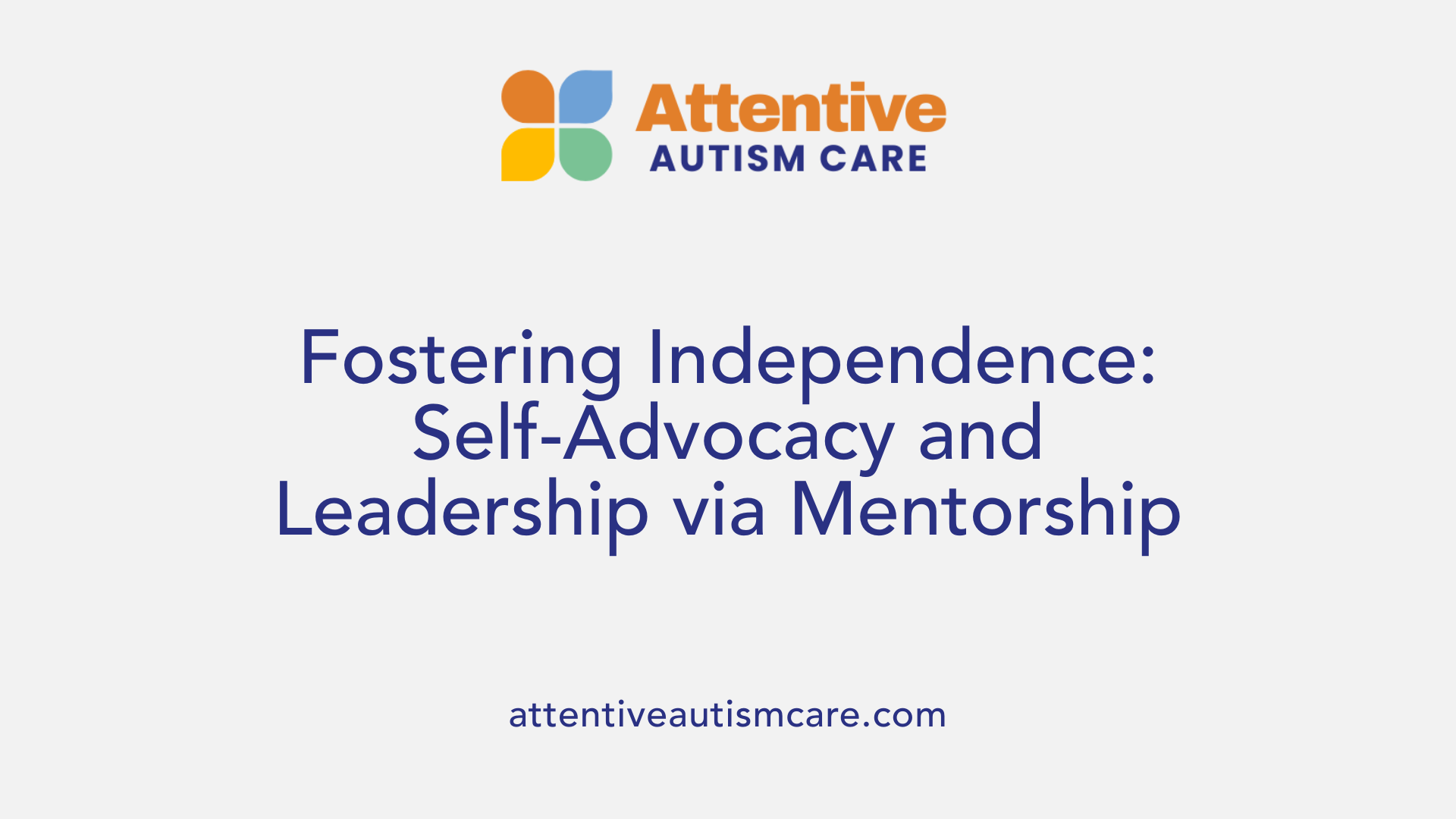
Helping Students Articulate Needs and Set Goals
Peer mentoring programs tailored for autistic students emphasize personalized support strategies that assist mentees in clearly expressing their individual needs. Through structured interactions, mentors guide students in setting realistic and meaningful goals aligned with their academic and social priorities. This goal-setting process not only empowers students but also enhances their ability to request accommodations and resources effectively.
Encouraging Leadership Skills
These programs also foster leadership by providing mentees opportunities to practice decision-making and take initiative within supportive environments. By participating in peer-led activities and collaborative tasks, students develop confidence in their abilities to influence their educational journey and social interactions. Inclusion of neurodiverse mentors further promotes empathetic guidance and normalizes leadership roles among autistic individuals.
Fostering Independence
Structured mentoring sessions are instrumental in cultivating independence, offering a safe space for autistic students to develop self-management and problem-solving skills. Each session typically includes discussions aimed at enhancing self-advocacy, encouraging students to monitor their progress and adjust strategies as needed. This approach builds their autonomy and prepares them for successful transitions in higher education and beyond.
The combined focus on articulating needs, goal setting, and leadership within peer mentorship highlights a dynamic pathway to strengthen independence for autistic students, supporting their academic success and personal growth.
Inclusive Environments and Neurodiverse Mentors
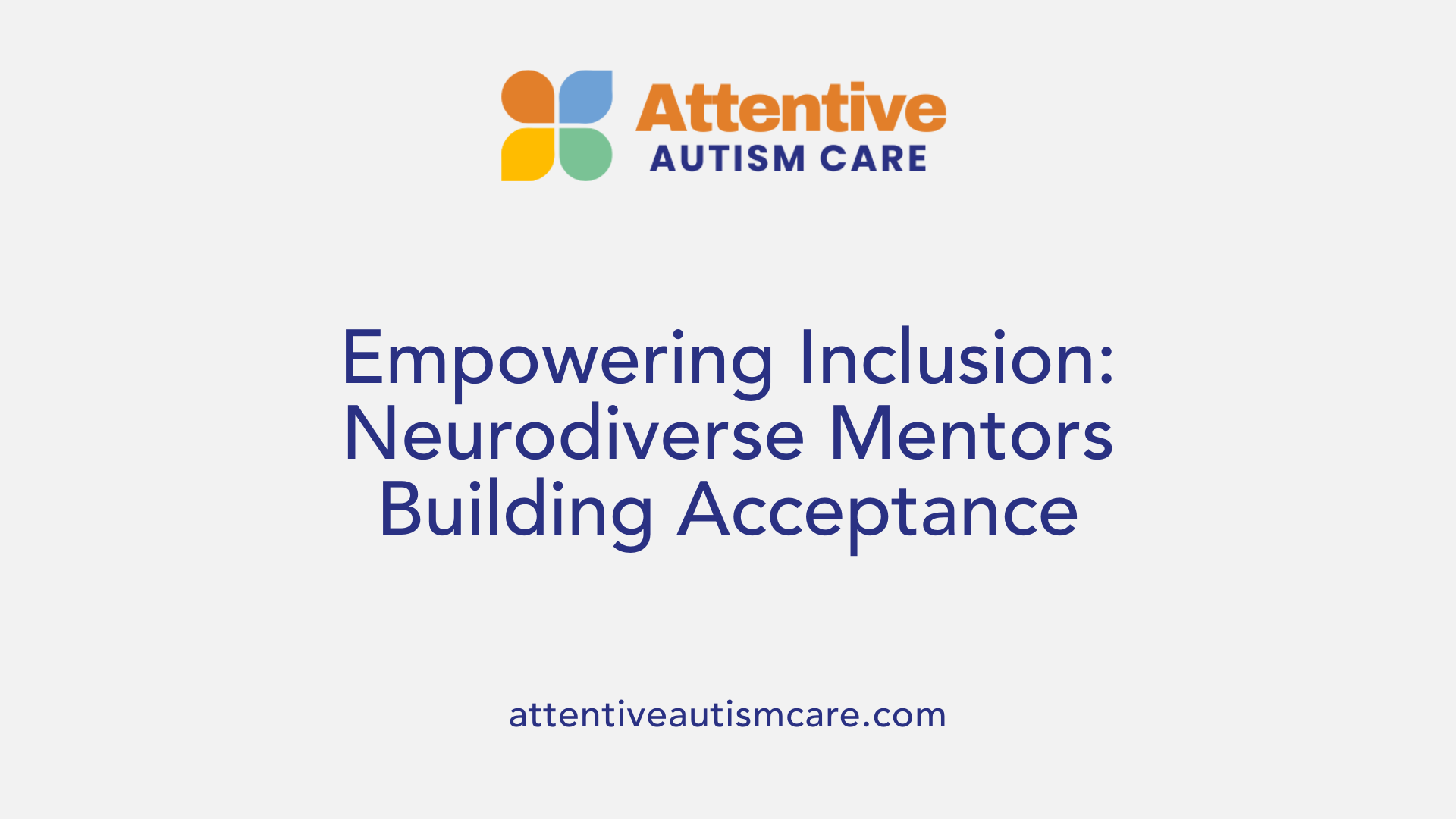
Benefits of Neurodiverse Peer Mentors
Neurodiverse peer mentors play a crucial role in supporting autistic individuals by sharing lived experiences and understanding unique challenges. Their involvement creates a mentoring relationship built on mutual understanding and trust, which often leads to enhanced self-esteem, greater confidence, and improved communication skills for mentees.
Normalizing Neurodiversity
Including mentors who are themselves neurodiverse helps normalize various ways of thinking and behaving, making neurodiversity visible and respected in educational and social settings. This normalization decreases stigma and fosters acceptance among peers, encouraging autistic individuals to feel comfortable and authentic.
Creating Empathy and Acceptance
Neurodiverse mentors contribute to building empathy by sharing personal narratives and modeling inclusive behaviors. Their presence supports an environment where diversity is not merely tolerated but celebrated. This dynamic increases social cohesion and mutual respect, promoting broader acceptance across communities.
Collectively, neurodiverse mentors enhance peer support programs by fostering safe, inclusive environments that empower autistic individuals to thrive academically, socially, and emotionally.
Use of Technology and Hybrid Formats in Peer Support Delivery
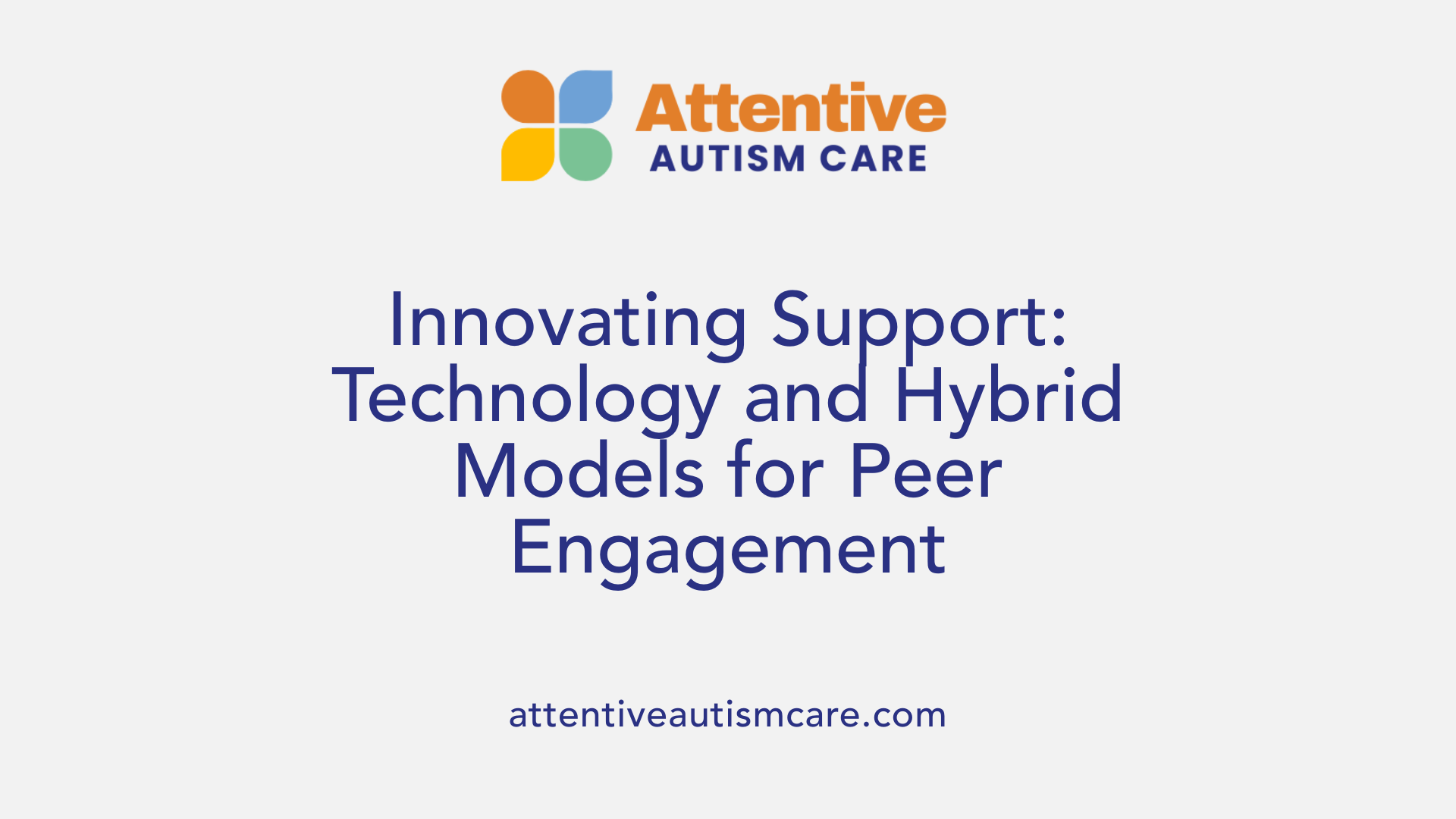
Face-to-face, online, and hybrid models
Peer support programs for autistic individuals traditionally rely on face-to-face interactions, which provide structured and manualized settings often facilitated by trained peers or autistic professionals. However, online and hybrid models are increasingly incorporated to expand access and inclusivity. These hybrid formats combine in-person meetings with virtual components, offering flexibility that caters to varied needs and schedules.
Increasing accessibility
The integration of technology in peer support allows autistic participants who may face geographical, physical, or social barriers to engage more easily. Hybrid programs often include multi-modal communication methods such as video calls, chat platforms, and asynchronous messaging. This flexibility enables participants to choose their preferred communication style and environment, supporting comfort and reducing sensory overload.
Addressing technical challenges
While technology broadens reach, it also introduces challenges such as connectivity issues and the need for digital literacy among participants and facilitators. Scheduling conflicts and maintaining engagement in virtual spaces can be hurdles. Programs that succeed emphasize thorough training for peer supporters in online facilitation, troubleshoot technical problems promptly, and foster safe, inclusive virtual spaces to mimic the rapport built in person. Continuous feedback from participants helps refine these hybrid models, ensuring they meet diverse needs effectively.
Participant Experiences and Reported Benefits of Peer Support
Feeling Understood and Belonging
Participants in peer support programs for autistic individuals consistently report feeling better understood by their peers. This sense of shared experience fosters a strong feeling of belonging, reducing feelings of isolation common among autistic populations. Programs often emphasize mutual understanding and acceptance, allowing participants to connect authentically in a safe, inclusive environment.
Increased Confidence and Communication Skills
Many autistic individuals involved in peer mentoring highlight improvements in their communication abilities and confidence. For instance, both school-based and university programs report enhanced social skills and greater participation in social events. Improved communication alongside supportive peer relationships encourages self-advocacy and leadership, empowering participants to engage more fully in their academic and social lives.
Mental Health Improvements
Peer support has also been linked to positive effects on mental health and emotional well-being. While some programs show mixed results, participants often describe feeling emotionally empowered and less lonely. The presence of empathetic peer connections and trained mentors helps mitigate stress and anxiety, contributing to better overall mental health outcomes.
In summary, peer support initiatives provide autistic participants with meaningful opportunities to feel understood, boost their communication skills and confidence, and promote mental health benefits that support their personal growth and social integration.
Future Directions and Research Needs in Peer Mentoring for Autism
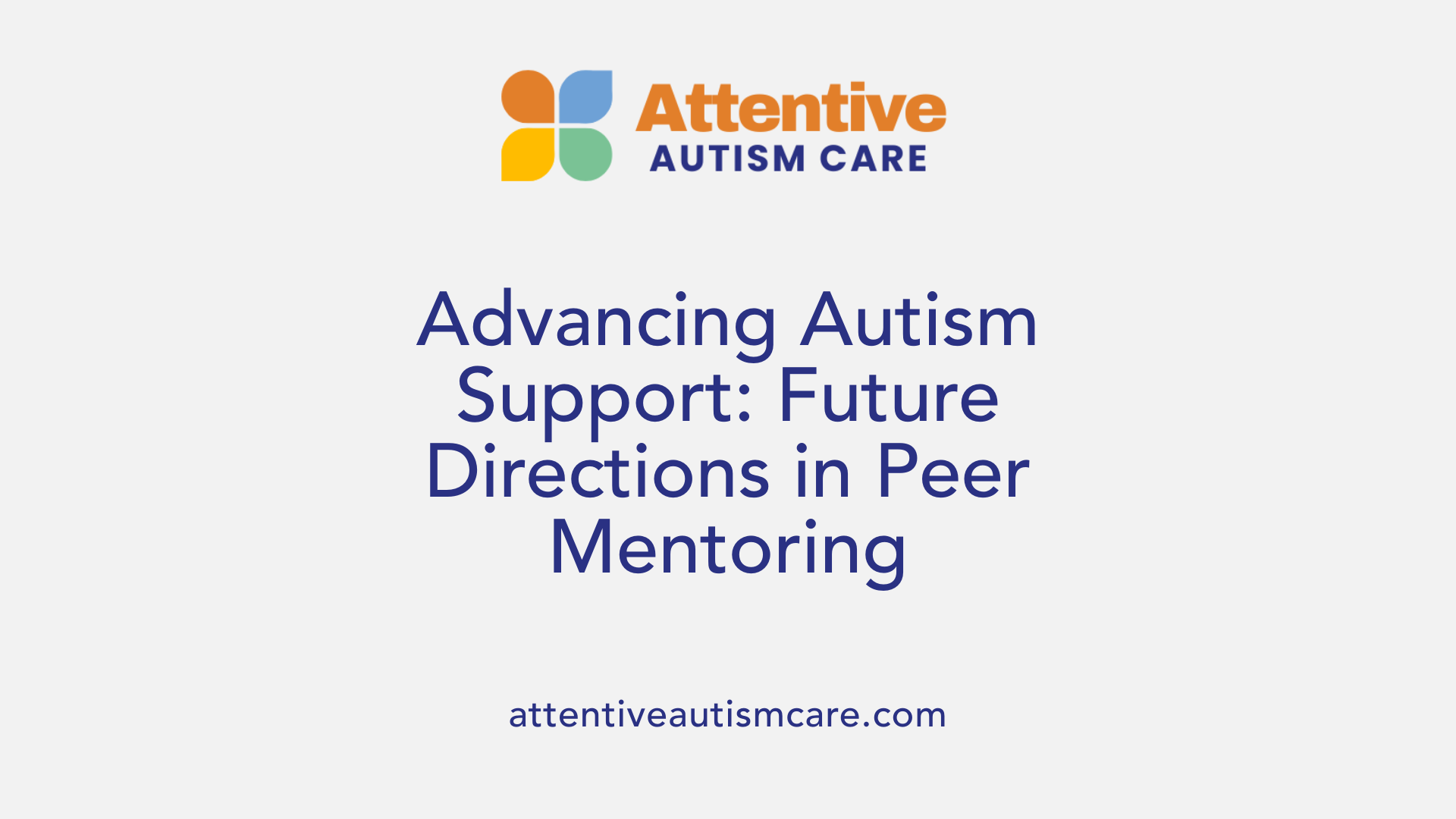
How can autistic individuals be involved in program development?
Involving autistic individuals in the development of peer mentoring programs is essential for ensuring that support is relevant, respectful, and effective. Co-design approaches allow autistic mentors and mentees to contribute insights about communication preferences, sensory needs, and social challenges. This participatory methodology fosters more inclusive environments and ensures that programs address real-world needs in culturally sensitive ways.
What are the economic sustainability challenges?
Economic sustainability remains a significant challenge for many peer mentoring programs. Funding limitations can restrict program duration, availability of trained personnel, and accessibility for diverse populations. To promote longevity, programs need to explore diverse funding sources such as grants, institutional support, and community partnerships. Moreover, demonstrating cost-effectiveness through rigorous evaluation can help justify continued investment.
Why are inclusive and culturally sensitive models important?
Adopting inclusive and culturally sensitive models enhances the reach and impact of peer mentoring. Programs must recognize the diversity within autistic populations, including variations in ethnicity, language, and socio-economic background. Tailoring mentorship content, communication styles, and meeting formats accordingly helps reduce stigma and promotes equitable access. Sensitivity to cultural norms and individual differences builds trust and encourages participation.
The future of peer mentoring for autistic individuals depends on research that integrates autistic voices, addresses economic barriers, and embraces diversity. Emphasizing rigorous study designs such as randomized controlled trials will strengthen the evidence base. Ultimately, community-driven and adaptable programs hold promise for improving academic, social, and mental health outcomes across diverse settings.
The Importance of Trusted Adult Mentorship for Adolescents with ASD
Association with higher social engagement
Trusted adult mentorship plays a crucial role in increasing social engagement among adolescents with Autism Spectrum Disorder (ASD). Data from the National Survey of Children's Health, which included 27,417 adolescents diagnosed with ASD, indicate that those with at least one trusted adult mentor demonstrate significantly higher levels of social interaction compared to those without such mentorship.
Normalizing social participation
Adult mentorship not only boosts social engagement but also helps normalize it, effectively elevating the social participation of adolescents with ASD to levels that surpass their peers without mentorship. This normalization is vital as it helps reduce feelings of isolation and promotes inclusion.
Supporting transitions to adulthood
Mentoring serves as a beneficial intervention during critical periods of change, especially before important life transitions such as entering postsecondary education or joining the workforce. Providing guidance and support through trusted adult relationships equips adolescents with ASD with the social skills and confidence needed to navigate these new environments successfully.
Conclusion: The Transformative Power of Peer Mentoring in Autism
Peer mentoring represents a promising complement to traditional therapies like Applied Behavior Analysis by fostering social skills, academic engagement, and emotional well-being among autistic individuals across the lifespan. While challenges such as stigma and resource limitations persist, tailored, flexible peer support programs designed with direct involvement of autistic individuals show significant potential. Future research with rigorous methods and broad inclusivity will further validate and refine these approaches, ultimately contributing to greater societal acceptance and empowerment of the autism community.
References
- Peer Support in Autism
- A Scoping Review of Peer Mentoring Programs for Autistic ...
- Enhancing Accessibility in Peer Mentor Programs for ...
- Impact of peer-support programs for individuals with autism
- The role of mentorship on social engagement among ...
- Pros and Cons: Scoping Review Identifies Benefits ...
- Applied Behavior Analysis (ABA)



































































































